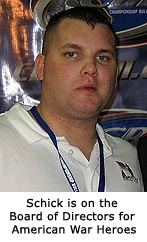

In 1946 the name was changed to Schick, Inc., and in 1981 Norelco took over operations. The business grew steadily as new models were introduced, and in 1940 Schick Dry Shaver was incorporated in Delaware as Rainbow, Inc. Although the early electric razor did not meet widespread acceptance, as Schick had hoped, he was able to open a factory in Stamford which employed 100 people. In 1930 the firm was incorporated as Schick Dry Shaver, Inc. Jacob Schick Hollywood After a triple-stacked tank mine detonated below his vehicle in Al Anbar Province, Iraq in 2004, Jake suffered compound fractures in his left leg and left arm multiple skin, ligament and bone losses varying burns partial loss of his left hand and arm amputation below the knee of his right leg traumatic brain. Believer, Grateful Father, Soul Feeder, Chief Executive Officer at One Tribe Foundation, Public Speaker, Actor, Eternal Student.

So sure was he of the electric dry shaver’s potential, Schick sold the assets of his razor company in 1928 in order to capitalize the new invention. Although the Magazine Repeating Razor did well in the marketplace, Schick went back to developing the dry electric razor, and in 1927 his invention was fully marketable. The razor’s design used the principles of repeating firearms, and blades were sold in clips and loaded into the razor, without ever having to touch them. Jacob Schick offer telehealth services Dr. View a map and get directions on CareDash. Later, inspired by weaponry he saw in the service, Schick went to work to develop the Magazine Repeating Razor, and in 1925 he started a company of the same name. Jacob Schicks office is located at 1 Medical Center Boulevard, Chester, PA 19013. Once Schick was able travel again, his doctor suggested that he move to a colder climate to improve his health. to convalesce, which took more than a year.

His illness forced him to return to the U.S. Colonel Jacob Schick changed the face of shaving nearly 100 years ago, and we keep that spirit of innovation alive by consistently evolving and challenging ourselves to make products that are not only personalized and advanced, but also really easy-to-use. Further plans to perfect the electric dry shaver were put on hold when Schick returned to active military duty during World War I. Army in 1898 and was stationed in the Phillipines, where he contracted a severe case of dysentary. Plans for the machine were sent out, and manufacturers quickly rejected the bulky invention. Finding it difficult to shave and, at the same time, having time on his hands while recuperating, Schick drew up crude plans that featured a shaver with a shaving head driven by a flexible cable and powered by a grapefruit-sized external motor. The idea of creating an electric razor came to him while he recuperated from an injury suffered while doing some gold exploration in Alaska and British Columbia in the early 1910s. On May 13, 1930, Colonel Jacob Schick obtained patent No.


 0 kommentar(er)
0 kommentar(er)
